- Home
- Peter Carey
Oscar and Lucinda bw-1988 Page 3
Oscar and Lucinda bw-1988 Read online
Page 3
He grunted and rubbed his hands together. His ear was still aching from the blow. The taste in his mouth was vomit, but what he remembered was plums, raisins, cherries, suet, custard made from yellow-yolked eggs and creamy milk. This was not the fruit
/ 16
The Anglican Church
of Satan. It was not the flesh of which idols eat.
"Dear God," he said, and the straight edge of his teeth showed, "if it be Thy will that Thy people eat pudding, smite him!"
He twisted his limbs around the sandy corridors of prayer. He looked up to see his father almost out of the sea. He struggled to his feet. His knees went click; first the left and then the right, and then he ran, the guilty and obedient son, to help with the little creatures his father had captured, the anemones, antheas with fragile white tentacles, redbannered dulses, perhaps a sleek green prawn or a fragile living blossom, a proof of the existence of God, a miracle in ivory, rosy red, orange or amethyst.
He ran with his arms flailing, his lower legs kicking out awkwardly. He was not an athlete, but he was at the water's hissing edge when his father emerged, like a matted red-lipped Neptune, blue-nosed, encased in dripping wet wool and shining burnt toast. It was then, as he took the heavy buckets, as he knelt to untie the ropes, that he saw his father had been smitten. Theophilus's teeth were chattering, his limbs shivering. Red blood came from the wound in his thigh and the instrument, the naturalist's own rock chisel, was still in his hand. Sea water had kept the blood washed away, but now it rose through the blue serge, a thick flower of it, unnaturally bright.
Oscar was no longer angry. He lowered his bucket, frightened of what he had begun. The Anglican Church
*4
The Reverend Hugh Stratton saw Oscar praying. He did not know he was praying. The boy was standing at a kink in the path at the top of the combe with two spilling, brimming buckets hanging from the ends of his long pale wrists. He was praying with his "inside" voice, 17
Oscar and Lucinda
with his lips still. He was praying that his papa would not die. He felt cold and tight across his chest. The pain in his arms did not seem related to buckets. "Oh Lord, do spare him please, even though he be in grievous error. Let not his blood be poisoned in Thy smiting. Let him not be taken in ignorance. Dear Jesus who died for us, lift the scales from his eyes so he may see true light. Let him not be cast down. Let him sit with your saints in heaven." He did not pray for himself. But thoughts insinuated themselves between the warp and weft of the prayer. He tried to keep them out. They pressed in. He saw his father in a pinewood box with tiny handles. He saw Mrs Williams pack her case. She was going to "The Agency." She had threatened before. He had no money to pay Mrs Williams. These were selfish thoughts. He drove them out. He made his mind as bare as the meeting hall. He began again.
Hugh Stratton could not be privy to this praying. He saw only a boy with buckets. His back hurt. His sciatic was pinched. He had a pain pushing down his thigh, in his calf too. It pulsed in his left buttock and left testicle. He saw nothing admirable in the boy (nothing suggested angels or porcelain to him). His path was blocked by a boy with buckets and he thought nothing about him except that he was the son of the man who had stolen what was left of his congregation. Like smallpox, like plague, Theophilus Hopkins had emptied the pews one family at a time. The Reverend Mr Stratton imagined that he liked all men. No matter what tribulation he suffered personally, he tried to be fair, to see all points of view. But he could not abide the famous Theophilus Hopkins who had used the musical masculinity of his voice to seduce away his illiterate rural workers and leave him with the gleanings-two families of High-Tory Anglicans and one elderly rabble-rouser who was in rebellion against the Squire. The Easter Offering last year had been two shillings and sixpence halfpenny. A ton of coal cost seven shillings and sixpence.
Hennacombe was the sump, the sink-hole of the Anglican Church. It was a pit. It was a "living," hardly a living at all, in a county where the wheel had come late. It was a place for sledges whose runners had dug the lanes deeper and deeper, further from the sun. He loathed the red mud. It was like heavy glue around his boots and his left leg hurt every time he brought it forward. There were two red-backed hawks riding the updrafts from the cliff. They were not more than a chain away, but Hugh Stratton did not notice them. He edged around the boy who did not move from the path, although the path was
The Anglican Church
narrow. Hugh Stratton was accustomed to disrespect, eyen hostility. He imagined the boy was deliberately obstructing him.
He was carrying a sack of turnips on his narrow back and leading a lame horse; the horse could not bear the weight. He pushed around the boy. The sack knocked Oscar's shoulder and the horse pushed him back into the furze. Hugh Stratton did not see the boy stumble; he knew only that his back was hurting. He was pleased not to be greeted, to be "not seen" on Christmas Day. Dear Lord, forgive him. May the Lord forgive him and vouchsafe the health of his neighbours when they ate his fowls.
Hugh Stratton was forty years old, tall, stooped a little, with a face which had, from a distance, a pippin youthfulness to it-round cheeks, small pointed chin, a floppy fringe of sandy hair-but which showed, on closer examination, all the fine marks of pain and disappointment that buttered rum could not smooth over. He was an Anglican clergyman in a county with a popular Baptist squire. These circumstances made his position less powerful, and his financial situation more humble, but it need not have been desperate. Even when Theophilus Hopkins arrived from London and stole his congregation, he could have lived reasonably enough-for the vicarage had ten acres of good pasture attached to it. But he had no talent for farming. His wife had more, but not sufficient. She read the journals of the London Agricultural Society. She was in enthusiastic correspondence on the subject of a combined seed and manure drill. But there was no point. They could barely afford the postage stamps, and they were always in crisis with his back injured from lifting or their oats stunted or their sow aborting or, today, their fowls taking ill and dying just when they were plump enough for market. They would have fetched ninepence each. He could not bear the loss, God forgive him-he had beheaded them and dressed them as if they had died healthy. He had broken the sabbath to do it. As soon as the dismal morning service was over he had taken these dressed fowls across to the Squire's mansion, pretending them a gift. He was bartering, of course, but it was Christmas Day and he must pretend otherwise. He went to the kitchen door. They were Baptists. They despised him, not for trading, but for trading on Christmas Day. They knew it was not a gift. The cook gave him turnips as a measure of her feelings. He had hoped for something better, but he had pretended it was an exchange of gifts so he could not haggle. He worried about the safety of the dead fowls. May no illness come to the Squire's house. The Squire wore a tall hat, a high collar, a muffler around his neck. His long grey hair hung over his ears. His eyes were
Oscar and Lucinda
fixed, looked straight before him and shamed the devil. He would not put up with poisoning. He had a broad nose and defiant nostrils. He was rugged, bluff, kind, and he would lay his Dissenting whip across an Anglican's face for poisoning his people.
Hugh Srratton led the lame horse up the steep path, under the bare elms. He saw no beauty in these woods. Through black dripping branches he could see the Norman tower of St Anne's, and to the left a little, the high thatch of the vicarage. It had grey rock walls with lichen, stonecrop and moss, but he was no longer the clever man just down from Oriel, charmed by the rusticity, the peace, the little sundial in the garden which bore the legend "To serve and to rule." He knew the thatch was full of rot and the walls were seeping. It was money he thought of, and how to get it. 5
Stethoscope
The stool had three legs and stood against the sloping, flaking white wall of the attic in which Oscar slept. It was a sparsely furnished room, with just an iron cot, a rag rug, and a small spirit lamp. But it was a dry room, too, and it had a sweet, sappy smell whi
ch emanated from its ancient aromatic timbers. The stool was made from Devon oak and, while generally dark, was polished to a honey colour at its knees, the point at which two hundred years of hands had picked it up, swung it, set it down, always within this one cottage.
In the mornings Oscar stood on the stool and hoisted up his nightdress so that his father could listen to his chest with the stethoscope. He had never questioned why the stool was necessary, not even now that he had begun to question other aspects of his papa's practices. He stood on the stool. He hiked up his flannel while his father tapped at him anxiously, like a young and inexperienced man called to check for death watch beetle. This would happen first thing, as soon as he
•?n
Stethoscope
woke. He would have his bladder full. Sometimes his penis would be hard, sometimes not. Having no interest in the function of a hard penis, he was not embarrassed. When Oscar lifted his nightdress, his father observed the ginger hair growing around the genitalia. He observed this with a naturalist's eye, but not only. He did not like the appearance of the hair. With the hair came the great difficulty of life.
The stool was also used when Oscar slept, late at night, when Theophilus's eyes were tired and his fingers cramped from writing. His study (it was also Oscar's schoolroom), was across the way, at the top of the staircase, and at two in the morning he would remove his shoes and come across, lifting his feet so as not to attract splinters, in his dainty yellow socks. Then he would lift the stool and place it, very quietly, next to his son's bed.
He sat and listened to him breathing.
In the morning he would listen with the stethoscope. The lungs were clear. They were always clear. He would hear himself say, "Clear as a bell," but it gave him no peace, for God had told him there was something wrong with the boy. This voice he heard may not have been what you would call God, but let it rest. You may have another word for all the things both Hopkinses (father and son) called God. It does not matter what you call it. For Theophilus it was God. It was his fear, his conscience, whatever you want, but it was clear to him. In any case, the boy had his sister's chest. The fluid in her little lung sacs still gurgled in the blocked drains of Theophilus's waking dreams.
When he sat down on the little stool he would draw up the eiderdown until it touched Oscar's little chin. The nail-bitten hand would then push the eiderdown away and Theophilus would smile and, in spite of his anxiety, he would not try to push it up again. His son had a white flannel nightdress and breath like warm milk. There was nothing to indicate the boy's troubled state of mind; for he now believed his father was in error, that he was wrong, not merely about puddings, but about many other things beside,
Theophilus, however, had no doubts about the life hereafter. It was this life he worried over. He feared his son would be "taken." He begged God to spare him. No voice came back. He would bear it if he must. If his God covered him with boils like Job, he would bear it. God took his daughter Sarah, his son Percy, his beloved wife. He had not been able to bear it, but he had borne it. There was nothing unbearable. The teeth of lions, the torture of martyrs, was a flea bite in the face of eternity.
Oscar and Lucinda
He thought himself a weak man, a sensualist.
Sometimes he wished only to lie on the bed and embrace his son, to put his nose into his clean, washed hair, to make a human cage around him, to protect his bird-frail body from harm; and what pride, he thought, what arrogance that would be.
For Oscar was already given to God. He was one of the elect. The mysteries of salvation had been divinely revealed to him. He had laid hold on Christ and would not be cast into hellnre. All this had been vouchsafed him.
And when he made himself think this last thought, Theophilus would feel the tension leave him. The muscles in his chest and upper arms would go soft and his breathing would become deeper and more regular. In his mind's eye he saw his own blood oxygenating, turning a deep and brilliant red. He stretched and felt the blood tingle in his hitherto clenched fingers. What a miracle Thou hast wrought.
He bent over his son and kissed the air above his forehead and then walked on tiptoe in that slightly exaggerated and silly way that men like Theophilus, normally gruff and bustling about their business, adopt as a sort of dance to celebrate their most tender feelings. 8
Pagan Sigijs
This was in Devon, near Torquay. To pretend-as Theophilus didthat this was almost tropical, is like referring to a certain part of Melbourne as "the Paris end of Collins Street." It is quite reasonable if you have never been to Paris, but once you have been there you can see the description as nothing more than wishful thinking.
When I visit Devon I see nothing tropical. I am surprised, rather, that so small a county can contain so vast and indifferent a sky. Devon seems cruel and cold. I look at the queer arrangements of rocks up
V)
Pagan Signs
on the moor and think of ignorance and poverty, and cold, always the cold. But Oscar had not yet seen the Bellinger River and he shared his father's view that they were privileged to live in the "almost tropics." It did not matter that he was chased and mocked by the sons of fishermen and farmers, that the Squire's cook's son made him eat a stone. This was an earthly paradise. They read London papers one day late. They gloated over myrtles and fuchsias unburnt by frost.
Half Theophilus's congregation still believed that the sun danced when it rose on Easter morning, and many claimed to see a sheep dancing with it. This was a county where cockerels were still sacrificed at the winter solstice. Theophilus had himself recorded a wassailing where a naked boy was sat up an apple tree and made drunk (he thought) on toast soaked with cider. He had not come in search of pagan darkness. He had come to study the marine zoology, but now he was here he would bear witness to the miracle of the resurrection. He was dismayed, often, at the depth and complexity, the ancient fibrous warp, the veinous living wefts, of the darkness that surrounded him.
When he found pagan signs scratched on his path one morning, he recorded them in his notebooks, thus:
Theophilus imagined he recorded this in a scientific spirit, and even if he was meticulous in rendering the exact proportion of the sign, he was not a dispassionate observer. The sign frightened him. And just as he had seen a mockery of the crucifixion at the wassailing, he now saw a heathen assault upon the sanctity of the cross.
He could not leave it. He must tilt at it. But where to tilt he was not sure. He walked all the way to Morley, briskly, imagining he would find someone in the public house. It was Bargus he had in mind, he who had been a warrener and was now the sexton. But when he entered the Swan at Morley he found it completely empty. He turned around and walked back, four miles across the fields.
Theophilus was agitated at the time he had wasted. He was completing the illustrations for his Corals of Devon. He must produce two drawings every day, to meet his deadline. Today he had done no drawings except this sacrilegious symbol. He was out of breath when he climbed over the stile at Hennacombe and saw Bargus sitting on the little stone bridge which was built across the stream there. He did not think himself a superstitious man, but this "coincidence" unnerved him.
Theophilus gave Bargus credit for some kind of power, which the old man would have been surprised to know. He was over seventy years old, short, broad-chested, with red cheeks and a snow-white,
shovel-shaped beard-He was one of those men whose &eai business in life it is, a matter more important than any other, to be liked, and in this he had been generally successful. When the gentleman thrust the notebook at him, he took it. He looked at the drawings of the markings, and then he looked at the other drawings «as well. He admired the felicity of the sketches of ferns, furze, early violets, sweet oar-weed and then, smiling, but puzzled, he gave the book back.
"Very fine," he said, and then set about stuffing his pipe. He had intended to save his last twist of tobacco for the inn, but he was discomforted-He did not know how to take the fellow's death'sh
ead grin. He had never seen a grin like this. He thought, stuffing the pipe, "Why would the fellow grin at me in such a way?"
He looked up, squinting a little as if he might bring the meaning of the other's smile into focus. It was getting cold quickly now the sun had gone. He made some comment about this.
"So," said Theophilus, tapping his book, stamping the mud off his boots on the stone bridge, still grinning all the while. "You can make no sense of this?" "Nor hide nor hair." "It is the Holy Cross?"
"Oh, aje," said Bargus, who had thought it looked like a children's game, "I do not doubt it." jheophilus bade him an abrupt good-day. He did not believe a word Bargus said. He was a pagan. He liked to lead a coffin three times around the granite cross at St Anne's. He had walked before the coffin with his blue eyes blazing, his spade held out from him and down. When he said he did not understand, Theophilus saw this as certain
proof he did. But Bargus-who was now walking slowly across the path to the 24
Throwing Lots
Swan at Morley with his pipe still unlit-was not the one who had made these signs, and Theophilus put away his notebook without guessing their true author. Mrs Williams's suspicions were better placed. She was walking to the post office at Morley-this was two days later-when she came across another set of what were now known locally as
"witches' markin's." She was rushing noisily along, a big-bummed, whiteaproned figure on a long red hill. She wore the apron everywhere. In Morley they called her "Nurse." She did not mind the title either.
Oscar was with her, counting the steps to the village. He walked alongside her, a little behind, scratching the line of their journey with a pointed stick.
Mrs Williams was never comfortable standing still. She found it nigh impossible. She had jumped and jiggled inside her mother's womb and she had jumped and jiggled ever since. But when she came across these markings, she took a good long pause.

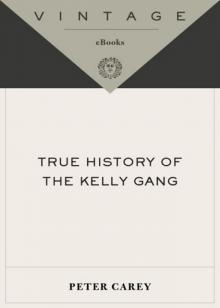 True History of the Kelly Gang
True History of the Kelly Gang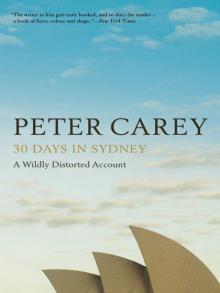 30 Days in Sydney: A Wildly Distorted Account
30 Days in Sydney: A Wildly Distorted Account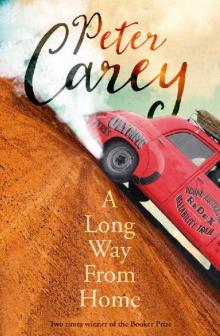 A Long Way From Home
A Long Way From Home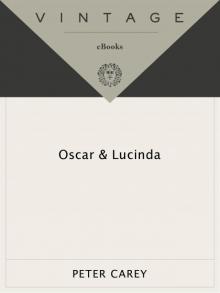 Oscar and Lucinda
Oscar and Lucinda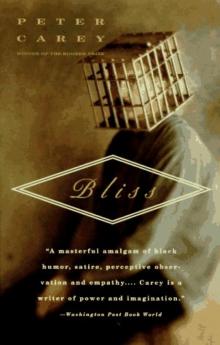 Bliss
Bliss Wrong About Japan
Wrong About Japan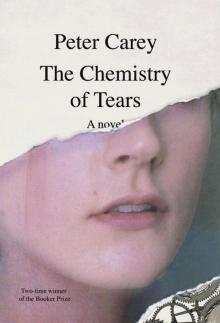 The Chemistry of Tears
The Chemistry of Tears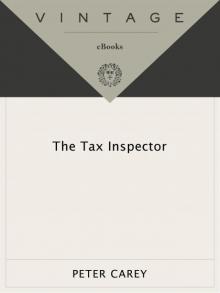 The Tax Inspector
The Tax Inspector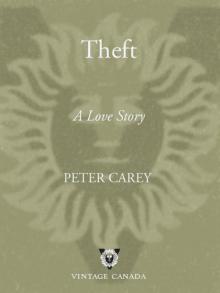 Theft: A Love Story
Theft: A Love Story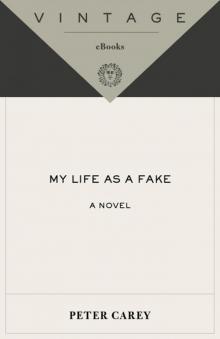 My Life as a Fake
My Life as a Fake Collected Stories
Collected Stories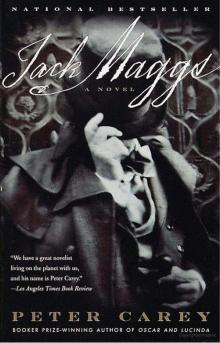 Jack Maggs
Jack Maggs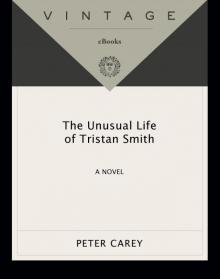 The Unusual Life of Tristan Smith
The Unusual Life of Tristan Smith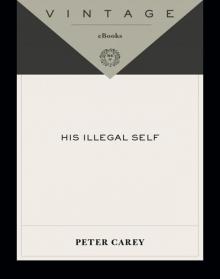 His Illegal Self His Illegal Self His Illegal Self
His Illegal Self His Illegal Self His Illegal Self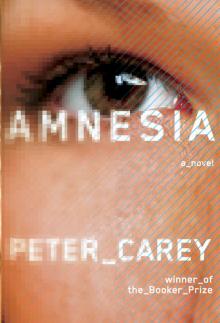 Amnesia: A Novel
Amnesia: A Novel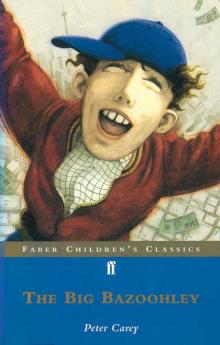 The Big Bazoohley
The Big Bazoohley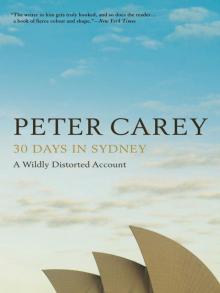 30 Days in Sydney
30 Days in Sydney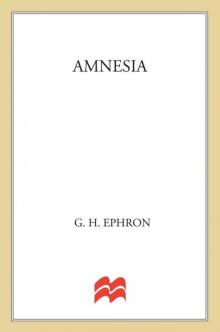 Amnesia
Amnesia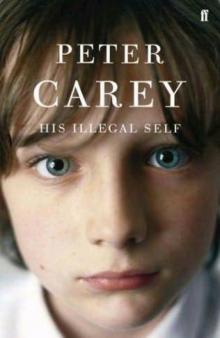 His Illegal Self
His Illegal Self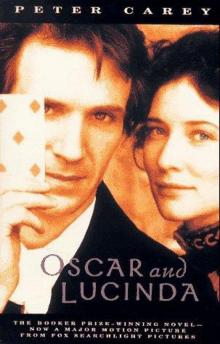 Oscar and Lucinda bw-1988
Oscar and Lucinda bw-1988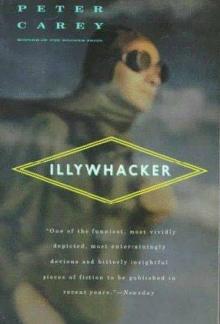 Illywhacker
Illywhacker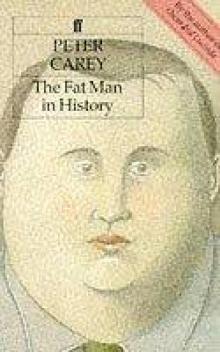 The Fat Man in History aka Exotic Pleasures
The Fat Man in History aka Exotic Pleasures